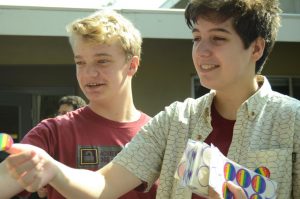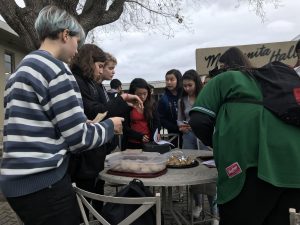Heart of Harker: Being LGBTQ+ at prom
April 25, 2019
Prom season is upon us, and we’re all expecting the cute asks, matching outfits and cheesy slow songs. But for Harker’s LGBTQ+ students, prom isn’t just a time of fun traditions. With every promposal or slow dance, we wonder how the people around us are going to react. More often than not, the students around us are incredibly supportive, cheering and giving congratulations. But where’s the line between being supportive and making LGBTQ+ students feel singled out?
The line depends on how a straight, cisgender couple would be treated in the same situation. A promposal for a gay couple shouldn’t be treated any differently from a promposal for a straight one, even if allies are worried that they might come across as being unsupportive or uncomfortable. We don’t want to be overly congratulated for just living our lives like any cisgender, heterosexual couple, whether that means people “oohing” and “aahing” at a promposal or gathering around to watch a same-gender couple during a slow dance. Especially when a straight and cis couple wouldn’t garner anywhere near the same level of attention. The public support, even though it’s well-meaning, sometimes borders on overwhelming to the point of making us uncomfortable.
So what can you do to show your support without making LGBTQ+ students feel singled out? The answer is pretty simple: just don’t try to offer extra support, even if it’s to make clear that you’re not homophobic or transphobic. Treat us like you would anyone else; we don’t want our relationships to be the center of attention any more than you do. Saying congrats after a promposal is enough to show your support of us; you don’t need to go to extra lengths to make your allyship felt. And as for slow dances, don’t draw more attention to us than you would to any straight, cisgender couple. We want our experience at any dance, not just prom, to be a fun night, with a significant other if we have one. The best way to support us in that regard is by letting us have that experience without making it into a public display.


















![“[Building nerf blasters] became this outlet of creativity for me that hasn't been matched by anything else. The process [of] making a build complete to your desire is such a painstakingly difficult process, but I've had to learn from [the skills needed from] soldering to proper painting. There's so many different options for everything, if you think about it, it exists. The best part is [that] if it doesn't exist, you can build it yourself," Ishaan Parate said.](https://harkeraquila.com/wp-content/uploads/2022/08/DSC_8149-900x604.jpg)




![“When I came into high school, I was ready to be a follower. But DECA was a game changer for me. It helped me overcome my fear of public speaking, and it's played such a major role in who I've become today. To be able to successfully lead a chapter of 150 students, an officer team and be one of the upperclassmen I once really admired is something I'm [really] proud of,” Anvitha Tummala ('21) said.](https://harkeraquila.com/wp-content/uploads/2021/07/Screen-Shot-2021-07-25-at-9.50.05-AM-900x594.png)







![“I think getting up in the morning and having a sense of purpose [is exciting]. I think without a certain amount of drive, life is kind of obsolete and mundane, and I think having that every single day is what makes each day unique and kind of makes life exciting,” Neymika Jain (12) said.](https://harkeraquila.com/wp-content/uploads/2017/06/Screen-Shot-2017-06-03-at-4.54.16-PM.png)








![“My slogan is ‘slow feet, don’t eat, and I’m hungry.’ You need to run fast to get where you are–you aren't going to get those championships if you aren't fast,” Angel Cervantes (12) said. “I want to do well in school on my tests and in track and win championships for my team. I live by that, [and] I can do that anywhere: in the classroom or on the field.”](https://harkeraquila.com/wp-content/uploads/2018/06/DSC5146-900x601.jpg)
![“[Volleyball has] taught me how to fall correctly, and another thing it taught is that you don’t have to be the best at something to be good at it. If you just hit the ball in a smart way, then it still scores points and you’re good at it. You could be a background player and still make a much bigger impact on the team than you would think,” Anya Gert (’20) said.](https://harkeraquila.com/wp-content/uploads/2020/06/AnnaGert_JinTuan_HoHPhotoEdited-600x900.jpeg)

![“I'm not nearly there yet, but [my confidence has] definitely been getting better since I was pretty shy and timid coming into Harker my freshman year. I know that there's a lot of people that are really confident in what they do, and I really admire them. Everyone's so driven and that has really pushed me to kind of try to find my own place in high school and be more confident,” Alyssa Huang (’20) said.](https://harkeraquila.com/wp-content/uploads/2020/06/AlyssaHuang_EmilyChen_HoHPhoto-900x749.jpeg)














